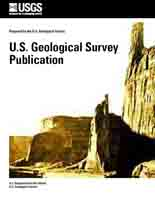Sixty-seven water analyses are reported for samples collected from 44 hot springs and their
overflow drainages and two ambient-temperature acid streams in Yellowstone National Park (YNP)
during 1990-2000. Thirty-seven analyses are reported for 1999, 18 for June of 2000, and 12 for
September of 2000. These water samples were collected and analyzed as part of research
investigations in YNP on microbially mediated sulfur oxidation in stream water, arsenic and sulfur
redox speciation in hot springs, and chemical changes in overflow drainages that affect major ions,
redox species, and trace elements. Most samples were collected from sources in the Norris Geyser
Basin. Two ambient-temperature acidic stream systems, Alluvium and Columbine Creeks and their
tributaries in Brimstone Basin, were studied in detail. Analyses were performed at or near the
sampling site, in an on-site mobile laboratory truck, or later in a USGS laboratory, depending on
stability of the constituent and whether or not it could be preserved effectively.
Water temperature, specific conductance, pH, Eh, dissolved oxygen (D.O.), and dissolved
H2S were determined on-site at the time of sampling. Alkalinity, acidity, and F were determined
within a few days of sample collection by titration with acid, titration with base, and ion-selective
electrode or ion chromatography (IC), respectively. Concentrations of S2O3 and SxO6 were
determined as soon as possible (minutes to hours later) by IC. Concentrations of Br, Cl, NH4, NO2,
NO3, SO4, Fe(II), and Fe(total) were determined within a few days of sample collection. Densities
were determined later in the USGS laboratory.
Concentrations of Li and K were determined by flame atomic absorption spectrometry.
Concentrations of Al, As(total), B, Ba, Be, Ca, Cd, Co, Cr, Cu, Fe(total), K, Li, Mg, Mn, Na, Ni, Pb,
Se, Si, Sr, V, and Zn were determined by inductively-coupled plasma-optical emission spectrometry.
Trace concentrations of Cd, Cr, Cu, Pb, and Sb were determined by Zeeman-corrected graphitefurnace
atomic-absorption spectrometry. Trace concentrations of As(total) and As(III) were
determined by hydride generation atomic-absorption spectrometry using a flow-injection analysis
system. Concentrations of Cl, NO3, Br, and SO4 were determined by IC. Concentrations of Fe(II)
and Fe(total) were determined by the ferrozine colorimetric method. Concentrations of NO2 were
determined by colorimetry using matrix-matched standards. Concentrations of NH4 were determined
by IC, with reanalysis by colorimetry where separation of Na and NH4 peaks was poor. Dissolved
organic carbon (DOC) concentrations were determined by the wet persulfate oxidation method.


